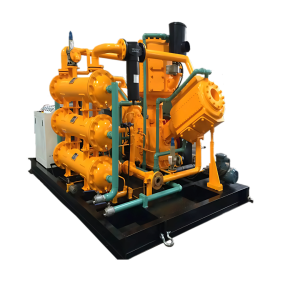In the world of liquid petroleum gas (LPG) distribution, loading and unloading tankers is one of the most critical and risk-prone operations. For companies transporting LPG, time is money — but so is safety, reliability, and efficiency. This is where a specialized LPG compressor becomes more than just an accessory; it becomes an essential tool.
Understanding the Challenge: Pain Points in LPG Tanker Operations
Transporting LPG involves strict pressure control and hazardous handling procedures. Companies often face:
Slow transfer rates, especially when relying on pump-only systems.
Loss of product during loading/unloading due to improper vapor recovery.
Safety hazards from pressure imbalances or system leaks.
Downtime caused by unreliable or unsuitable equipment.
Lack of explosion-proof systems that meet international standards.
These issues not only increase operational costs but also elevate risk levels, particularly in facilities with high tanker traffic or poor infrastructure.
The Smart Solution: How LPG Compressors Improve Loading & Unloading
Unlike traditional pumps, LPG gas compressors operate based on differential pressure transfer, allowing the gas to move from low-pressure to high-pressure zones. This makes them ideal for tank-to-truck, truck-to-tank, and inter-tank transfer operations.
Here’s how an LPG compressor solves key pain points:
✅ Faster Transfer Speeds
By utilizing gas pressure instead of liquid pumping, compressors reduce overall transfer time. In fact, loading or unloading a 20-ton LPG truck can be completed in under 40 minutes with the right system in place.✅ Zero Product Loss
Compressors enable vapor recovery, minimizing loss and maximizing product delivery. This directly translates into more revenue per shipment.✅ Enhanced Safety
With fewer moving parts in direct contact with flammable liquids, and the use of flameproof motors, compressors significantly lower the risk of ignition or leaks.✅ Dual-Function Capability
Many systems offer bi-directional transfer, meaning they can load and unload with the same machine — reducing investment and footprint.✅ Energy Efficiency
Compared to pumps, compressors require lower operational energy, especially over longer distances or uphill elevation scenarios.
Why Keepwin LPG Compressors Stand Out
Keepwin’s LPG compressors are engineered for real-world use. Whether you’re in the Middle East, Southeast Asia, or Latin America, our customers rely on us for compressors that are:
✅ Explosion-proof and compliant with ATEX, CE, and ISO9001 standards
✅ Tailored for mobile or skid-mounted systems
✅ Designed with 39+ years of engineering experience
✅ Proven in harsh conditions like high humidity ports and remote fuel stations
For example, our ZW-3.0/10-16 LPG compressor has been widely used in LPG truck unloading systems in Indonesia and propane recovery stations in Africa. The system integrates seamlessly with flexible hoses, vapor return lines, and automatic control panels — reducing operator workload while maximizing throughput.
When Should You Use an LPG Compressor Instead of a Pump?
| Situation | Recommended Solution |
|---|---|
| Long-distance transfer | LPG Compressor |
| Vapor recovery required | LPG Compressor |
| Limited electric supply | Compressor with diesel drive |
| Flammable zone (Zone 1/2) | Explosion-proof Compressor |
| Cost-effective unloading | LPG Compressor |
Ready to Upgrade Your LPG Transfer System?
If your operations involve LPG tanker loading/unloading, investing in a Keepwin LPG compressor will increase safety, reduce losses, and boost efficiency — all at once.
👉 Download our technical datasheet or contact our engineers to receive a customized recommendation for your application.











